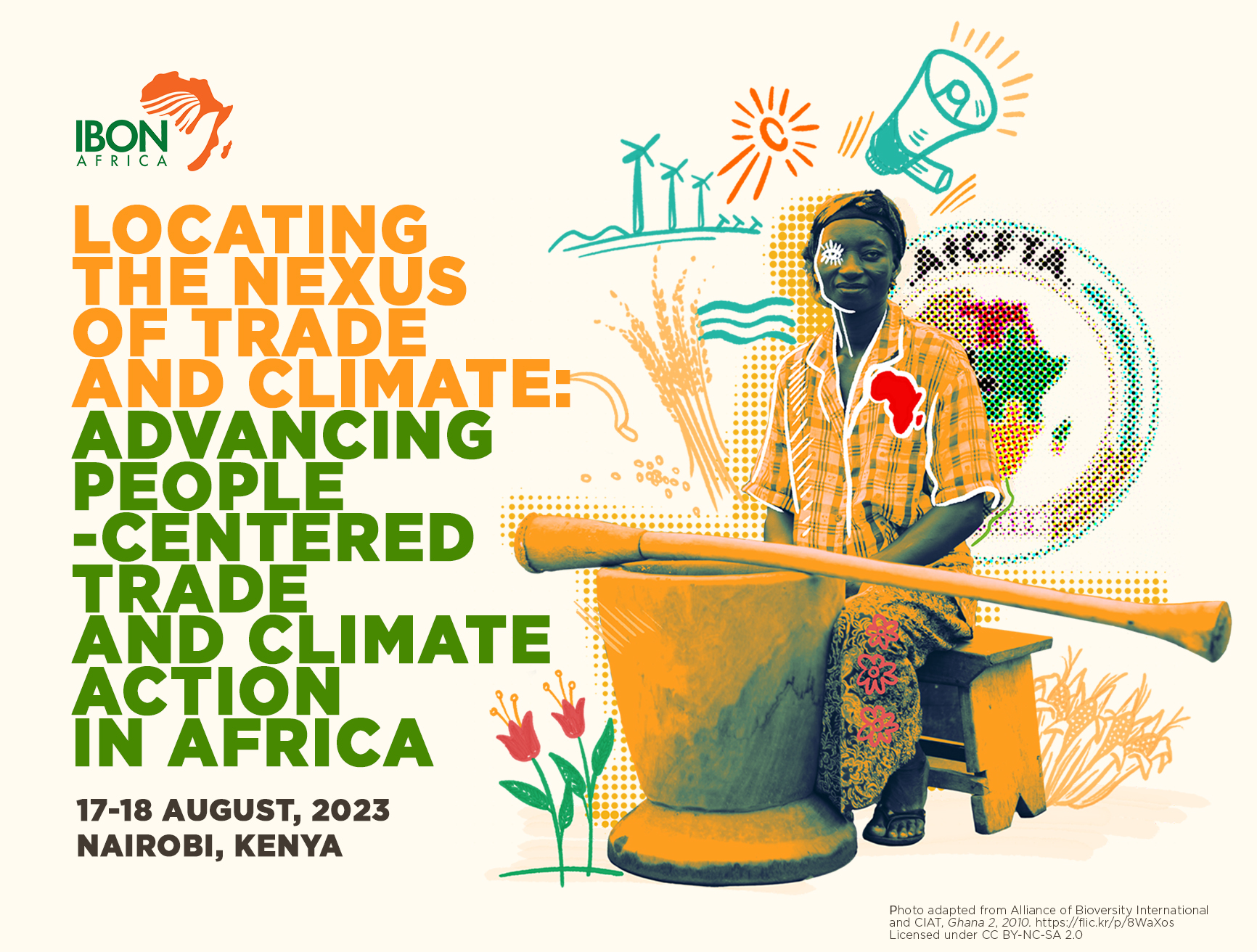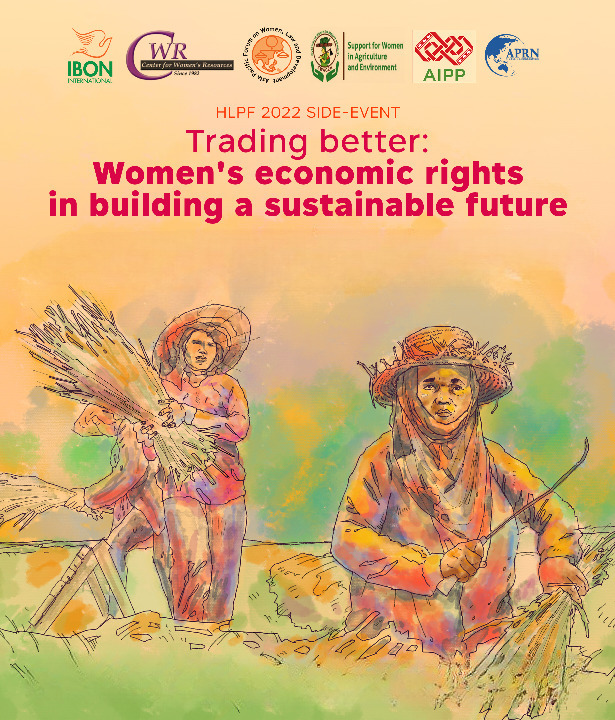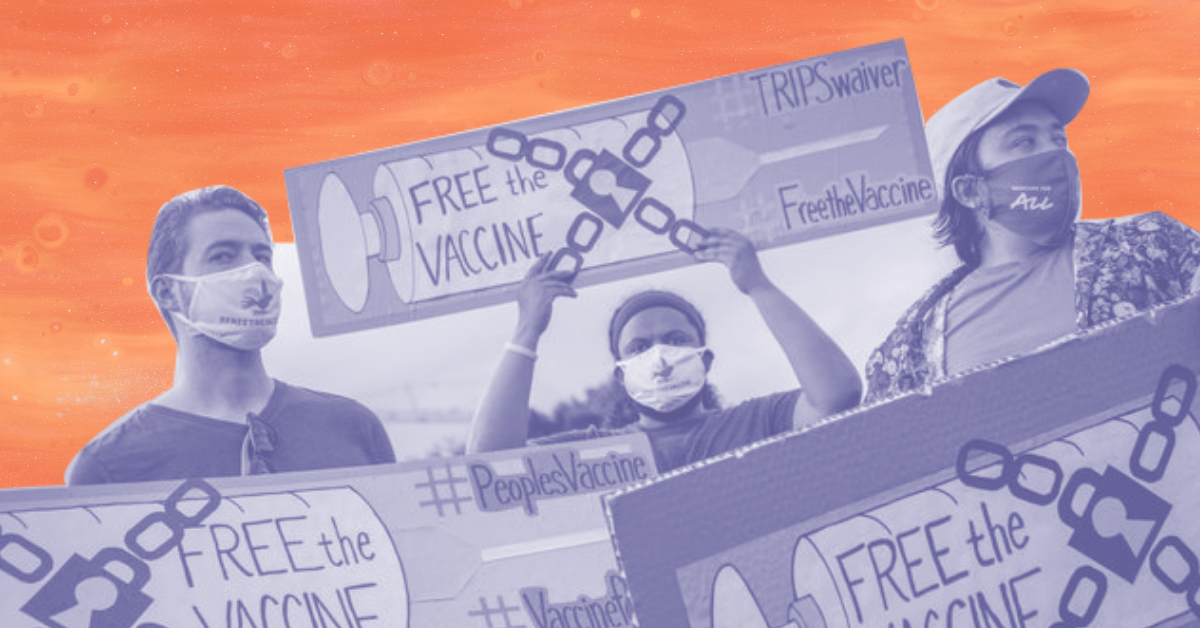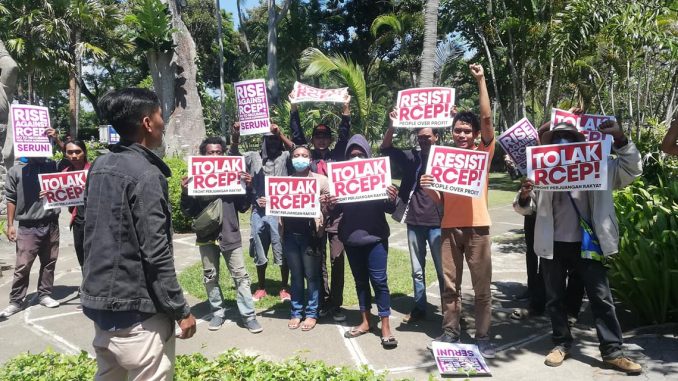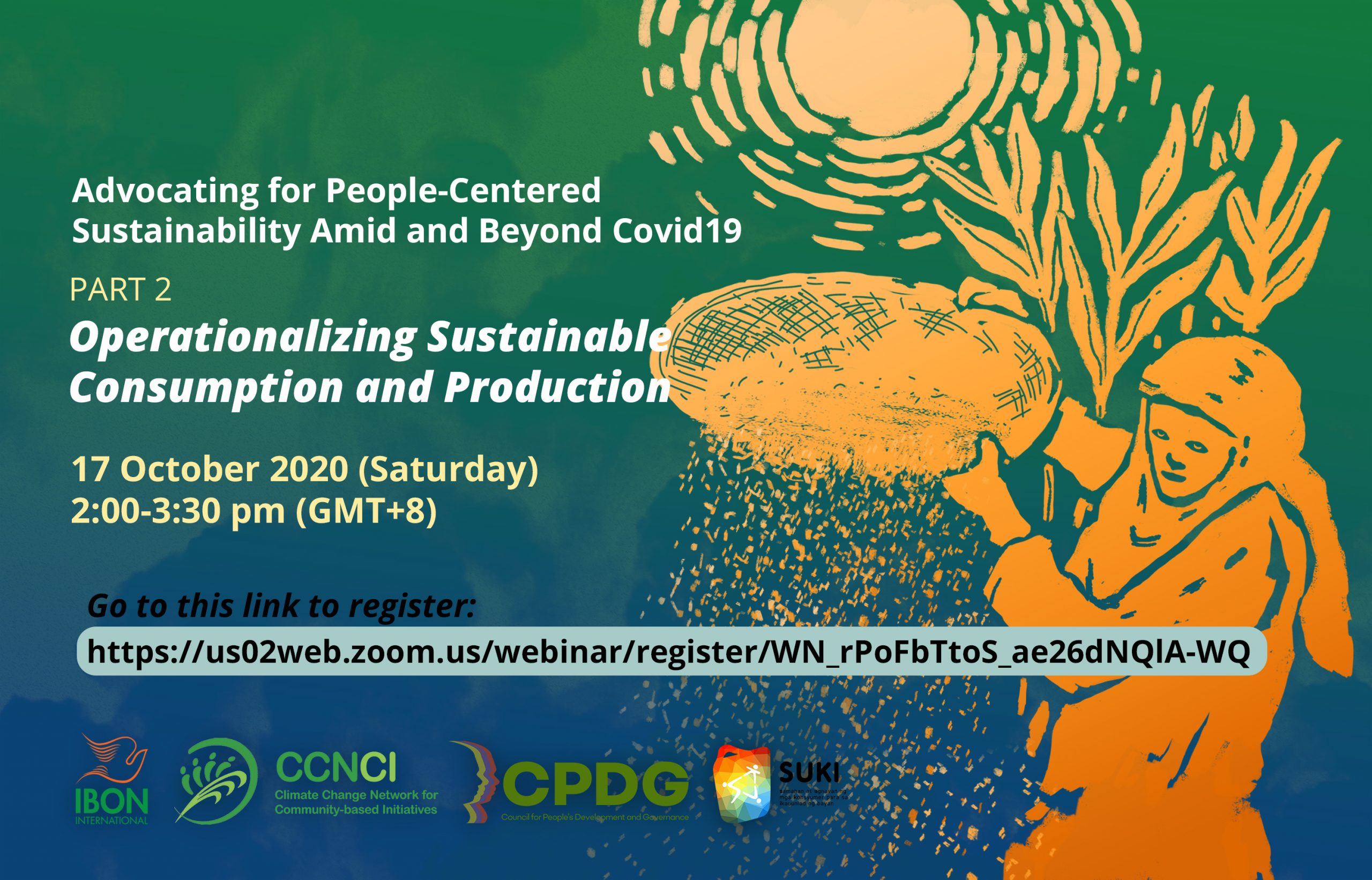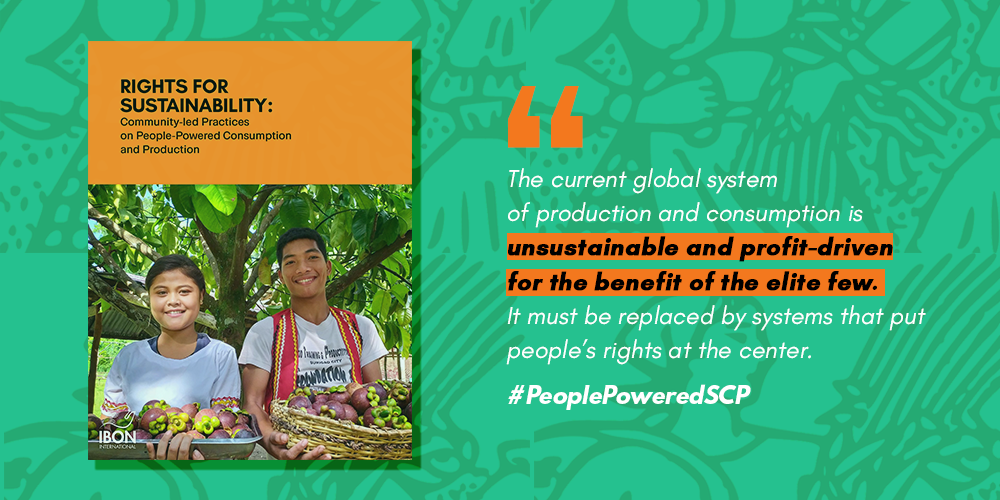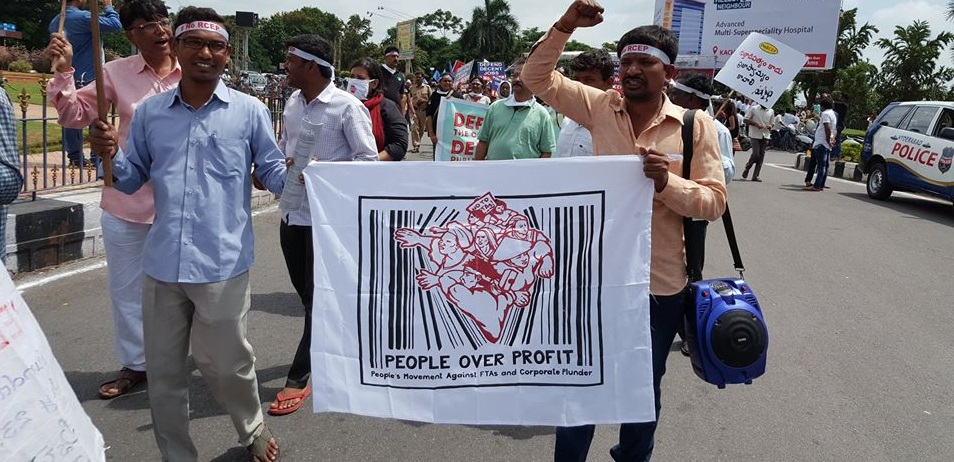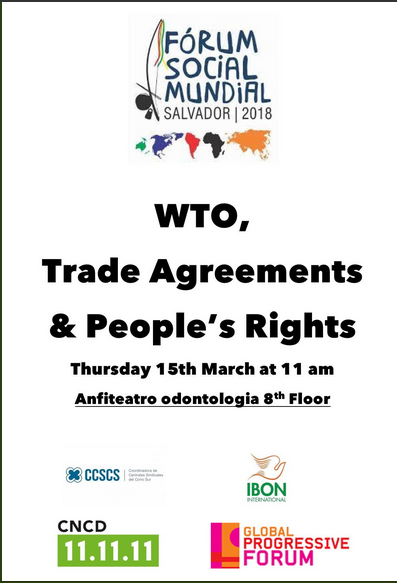This article is part of IBON International’s series on the world economic and political situation in 2025.
In the face of global hunger, genocide, and the climate crisis, free trade is promoted as usual. It has meant freedom for capital, while tying the Global South to commodity dependence and entrenching the Global North-South divide in development. Despite rising global food production, 733 million people face chronic hunger. The UN Trade and Development (UNCTAD) reported low global growth, across developed economies, emerging BRICS (Brazil, Russia, India, China, South Africa, Egypt, Ethiopia, Indonesia, Iran and the United Arab Emirates), and developing countries. High public debt among developing countries, which grew by 70% between 2010 to 2023, constrains fiscal and policy spaces towards sustainable development and climate justice.
Trade liberalisation enforced primarily by the World Trade Organisation (WTO) and free trade and investment agreements, as well as policy prescriptions by the IMF and World Bank, have eliminated trade barriers in favour of Northern capital and states, and fostered commodity dependence of Southern economies. Such trade rules have decimated Southern agriculture, production, and industries, worsened labour conditions, and intensified resource extraction, land grabs, and consequent climate and ecological impacts.
The WTO continues to lose credibility, and is increasingly challenged by developing countries. The WTO’s 13th Ministerial Conference (MC13) in February 2024 failed to address developing countries’ long-standing concerns on unfair rules on agriculture, fisheries subsidies, and import safeguards that undermine local production, livelihoods, and food security, while benefiting big agribusiness, industrial fishery, and big commodity traders. MC13 even expanded Northern corporate agenda through a plurilateral agreement on Investment Facilitation for Development (IFD) as a way to attract foreign investment and further integrate the Global South into global value chains, and supposedly catalyse sustainable development. South Korea, the United Kingdom, the European Union (EU), China, together with the WTO Director-General pushed for the IFD.
Despite the downward trend in foreign direct investments (FDIs) and the failure of FDI-oriented policies to facilitate technology transfer and know-how to developing countries, 86% of investment policy measures implemented in developing countries continue to favour investors through incentives and liberalisation. FDIs have stagnated since the 2008 global financial crisis. In 2023, FDI flows to developing countries fell by 7% to USD 861 billion. FDIs are largely concentrated in resource extractive projects such as commodity sectors, critical minerals, and renewable energy. Increasing demand for critical minerals for digital and renewable energy technologies risks further resource extraction in and consequent social and ecological harms to commodity dependent economies in the Global South. Meanwhile, developed countries implemented investment measures that were restrictive and less favourable to foreign investors “to address national security concerns.”
The majority or 74% of least developed countries remain dependent on commodity exports, which means at least 60% of their export revenue comes from raw materials (energy products, agricultural goods, and minerals). Commodity dependent economies are vulnerable to unpredictable changes in commodity market prices which could shrink revenues, affect public investments and debt payments, and, overall, stunt development.
The financialisation of global commodities, characterised by the increasing role of financial actors and expanding financial activities in the global commodity market to increase corporate profits, drives market volatility and corporate profiteering, while shortchanging commodity dependent economies. UNCTAD reported that “2023 marked the second most profitable year in history for the commodity trading industry” with estimates of total annual profits at over USD 100 billion as financial speculation boosted the profits of commodity trading giants Archer-Daniels-Midland Company, Bunge, Cargill and Louis Dreyfus, that control up to 70% of global food markets. Financialisation is also linked to the trend of mass layoffs, and race to the bottom wages and labour conditions.
During trade disruptions due to conflict and geopolitical tensions, corporations rake in even more profits by leveraging their market monopoly through markups which inflate consumer prices, passing on higher production and trading costs to consumers. In the context of the war in Ukraine, corporate profits of energy companies ExxonMobil and Shell, food and commodity companies Kraft Heinz, Archer-Daniels-Midland and Bunge, and mining companies Glencore and Rio Tinto surpassed inflation. Meanwhile, real wages and labour share in countries’ incomes have declined across the globe for decades. Household incomes have dropped by 8% since 2020 due to inflation.
Bilateral and mega-regional trade deals led by global powers continue to be negotiated and ratified without public participation and oversight. The African Continental Free Trade Area (AfCFTA) agreement supported by the European Union, the World Bank, UNCTAD, among others, appeals to Pan-Africanism to promote discredited trade liberalisation. Signed by 54 out of 55 African Union countries, it aims to “liberalise 97% of inter-African trade in goods, and set rules on trade in services, intellectual property, investment and e-commerce.” Critics warn about investment policies and climate protocols partial to foreign investments that will greenwash resource extraction and land grabs; the expansion of SEZs that compromise labour conditions and environmental regulation to attract foreign investment; intellectual property provisions threatening local seed sovereignty and agriculture, and access to medicines; an invasive and extractive digital trade; and dispute settlement mechanisms that will undermine countries’ sovereignty. The EU has pledged EUR1.1 billion to support the AfCFTA and 70 projects across various areas, including trade in goods, intellectual property rights, digital trade, trade in services, investment, among others, that aim to further African economic integration. The EU is Africa’s largest trading partner, accounting for 33% of the total trade of Africa in 2023. The trade between the two continents also increased by 27% since 2013 to EUR 367 billion in 2023.
The China-led Regional Comprehensive Economic Partnership (RCEP) has flooded Southeast Asia with cheaper Chinese imports and hit local production and livelihoods such as in Thailand, Indonesia, and Malaysia. RCEP covers China, Japan, South Korea, Australia, New Zealand and the 10 ASEAN member states of Brunei, Cambodia, Indonesia, Laos, Malaysia, Myanmar, the Philippines, Singapore, Thailand, and Vietnam.
Competition among global powers plays out in trade. US President Donald Trump is likely to withdraw from the previous Biden administration’s Indo-Pacific Economic Framework, while applying stringent protectionist policies. Trump made use of emergency powers to impose an additional 10% tariff on Chinese imports, 25% tariffs to its largest trading partners, Mexico and Canada, with a lower rate of 10% for Canada’s energy imports, and reciprocal tariffs on every country that taxes US imports. Trump’s 25% tariffs on all steel and aluminum imports also affect Canada and Mexico, among other countries supplying steel to the US. China responded with increased tariffs on American imports including coal, crude oil, and critical minerals. Canada, Mexico, and the EU are threatening retaliatory measures. Experts say that Trump’s measures against Canada could be a negotiating tactic to gain greater control over the latter’s energy resources.
Investor-state dispute settlement (ISDS) mechanisms under FTAs allow corporations to file a legal case against developing countries that were unable to meet policies conducive for big business, undermining their sovereignty and draining their resources. By 2023, there were a total of 1,332 ISDS cases, 70% of which were brought against developing countries including LDCs. The Global ISDS Tracker shows that USD 114 billion have been paid by governments to corporations, with fossil fuel companies benefitting the most, raking in USD 80.21 billion since 1998. Corporate gains from ISDS are almost equivalent to the climate finance shelled out by rich, polluting countries in 2022.
Free trade as usual has become untenable in the context of the genocide in Palestine, expanding war in the West Asia and North Africa (WANA) region and Africa, geopolitical tensions among global powers, and a worsening climate crisis, and is being challenged by social movements and states in the Global South. Armed resistance across the WANA region against the US-backed Israeli genocide in Gaza has disrupted trade in the Red Sea. Trade unions and activists have also organised strikes, boycotts, and direct actions, such as in the US, UK, Canada, India, and Greece, to prevent and block trade, especially of arms, to Israel. Trade disruptions due to conflicts, such as in WANA and the war in Ukraine, and climate change impacts, such as the drought in the Panama Canal, upset supply chains, raise trade costs, consumer prices, and threaten food security especially of import-dependent countries.
Shifts in trade policies related to climate and sustainability concerns largely greenwash resource exploitation, and pass the burden of decarbonisation to the Global South and strain their resources for climate adaptation. The EU’s Carbon Border Adjustment Mechanism (CBAM) which imposes carbon tariffs on carbon-intensive imports such as steel, cement, aluminium, fertilisers, electricity, and hydrogen could make trading with the EU costlier, affecting developing countries such as Mozambique, Bosnia and Herzegovina, Ukraine, Serbia, North Macedonia, Montenegro, Zimbabwe, Moldova, and Albania that rely on the EU as a major trade partner. CBAM ignores the principle of common but differentiated responsibilities, potentially harming countries that do not have capacities to comply with EU environmental standards. China, India, Brazil, and South Africa have voiced opposition against CBAM.
The UNCTAD promotes carbon markets as a way for LDCs to earn revenues to complement climate finance, citing their “significant land-based mitigation potential”. Yet, it also admits that “the anticipated benefits of carbon markets – such as technology transfer, education and community development – are uncertain for LDCs.” Fundamentally, it acknowledges that carbon markets are misaligned with the principle of common but differentiated responsibilities and do not address LDCs’ development needs.
Carbon offsets can be traded between two parties in carbon markets to allow the first party to continue emissions by reducing the emissions of the other party. Carbon emissions trading is criticised for allowing polluting corporations and rich countries to buy their way out and shift the burden of emissions reduction to the Global South. Carbon offsetting does not significantly contribute to emissions reduction, but even add to greenhouse gas pollution and ecological harm. A 2016 EU-commissioned study showed that 85% of the projects under the Clean Development Mechanism, the first and largest carbon trading scheme, “have overestimated their emissions reductions and supported no ‘additional’ low-carbon capacity in developing countries.” Carbon offset projects also make use of unproven and harmful carbon capture technologies, and are involved in land grabs, displacement, and human rights violations. For instance, Dubai-based Blue Carbon acquired millions of acres of land and forests across Africa in Tanzania, Zambia, Niger, Zimbabwe, and Kenya for its carbon offset projects. It also has projects in Papua New Guinea, Dominica, the Bahamas, St. Lucia, and Pakistan. #
Resources
Addis Standard. October 2024. “EU pledges €1.1 billion to support economic integration in Africa.”
Aljazeera. 4 March 2024. UN rights chief says ‘powder keg’ Gaza could ignite wider war.
Bilaterals.org & GRAIN. October 2023. “AfCFTA: More free trade? For whose benefit?”
Boak, Josh. 14 February 2025. “Trump signs a plan for reciprocal tariffs on US trading partners, ushering in economic uncertainty.” The Associated Press.
Business & Human Rights Resource Centre. October 2024. “Palestine/Israel: International companies supplying weapons to Israel face growing direct action amid calls to governments to enact an arms embargo against Israel.”
Chandran, Rina. February 2025. “U.S. tariffs on China can’t slow the impact of Chinese imports worldwide.” Rest of World.
Deshpande, Prashant Prabhakar. 20 August 2024. “A critique of Carbon Border Adjustment Mechanism (CBAM) – implications for Global South.”
Duggal, H. & Ali, M. February 2025. “Who sells the most steel and aluminium to the US and who is facing tariffs?”
Food and Agriculture Organization of the United Nations. November 2024. “FAO Statistical Yearbook 2024 reveals critical insights on the sustainability of global agriculture, food security, and the importance of agrifood systems in employment.”
Gabbatiss, J., Dunne, D., Chandrasekhar, A., Dwyer, O., Lempriere, M., Quiroz, Y., Tandon, A., Viglione, G., 25 September 2023. “In-depth Q&A: Can ‘carbon offsets’ help to tackle climate change?” Carbon Brief.
Goodman, Peter. February 2025. “How Trump’s One-for-One Tariff Plan Threatens the Global Economy.” The New York Times.
GRAIN & Mohamed Coulibaly. 28 November 2024. “The AfCFTA and land in Africa: towards a surge in land grabbing?” Bilaterals.org.
Greenfield, Patrick. 30 November 2023. “The new ‘scramble for Africa’: how a UAE sheikh quietly made carbon deals for forests bigger than UK.” The Guardian.
Inman, Phillip. December 2023. “Greedflation: corporate profiteering ‘significantly’ boosted global prices, study shows.” The Guardian,
Jones, A., Sood, A., & Sipalan, J. September 2024. “As cheap Chinese imports flood Southeast Asia, industries struggle to stay.” South China Morning Post.
Ma, Jason. 9 February 2025. “What does Trump really want from Canada and Mexico? It may come down to oil security and bringing both countries ‘under the US’s thumb.’” Fortune.
Neslen, Arthur. 6 June 2024. “Secretive court system has awarded over $100bn public money to corporations, finds new analysis.” The Guardian.
Olson, Stephen. January 2025. “The Economic Implications of Donald Trump’s Presidency for Southeast Asia.” Fulcrum on Southeast Asia.
Power, John. 5 October 2024. “Houthi Red Sea attacks still torment global trade, a year after October 7.” Al Jazeera.
Press and information team of the Delegation to the African Union. October 2024. “Global Gateway: EU Commissioner Urpilainen and AU Leadership strengthen partnership and take stock of progress.” European External Action Service
Ramachandran, V., Smith, A., & Satvika, M. 28 May 2024. “Land Grabs for Carbon.” The Breakthrough Institute.
Sengupta, Ranja. May 2024. A failure to reach equitable outcomes: Agriculture and fisheries subsidies in MC13. Third World Network.
Singh, Rimjhim. September 2024. “Southeast Asia’s local industries struggle with influx of Chinese imports.” Business Standard.
Trachtman, Joel & Remy, Jan Yves. 15 November 2023. “Comment: The EU’s carbon border tax is a blow to climate justice. Here’s how to fix it.” Reuters.
UN Trade and Development. December 2024. “733 million people face chronic hunger: Here’s how trade can help.”
UN Trade and Development. November 2024. The Least Developed Countries Report 2024: Leveraging carbon markets for development.
UN Trade and Development. October 2024. “UNCTAD calls for a “rethink” of development strategies amid global economic slowdown and rising social discontent.”
UN Trade and Development. July 2024. Digital Economy Report: Shaping an environmentally sustainable and inclusive digital future.
UN Trade and Development. 20 June 2024. World Investment Report: Investment facilitation and digital government.
UN Trade and Development. April 2024. “Critical minerals boom: Global energy shift brings opportunities and risks for developing countries.”
UN Trade and Development. April 2024. “Trade and development report update.”
UN Trade and Development. 26 January 2024. “Red Sea, Black Sea and Panama Canal: UNCTAD raises alarm on global trade disruptions.”
UN Trade and Development. 22 January 2024. “Foreign direct investment in developing economies fell 9% in 2023.”
UN Trade and Development. October 2023. Trade and Development Report 2023. Growth, Debt, and Climate: Realigning the Global Financial Architecture.
UN Trade and Development. October 2023. Commodities and Development Report 2023: Inclusive Diversification and Energy Transition.
UN Trade and Development. October 2023. “Commodity dependence: 5 things you need to know.”
Weko, Silvia. 26 September 2024. “The future for global trade in a changing climate.” Chatham House.
The White House. February 2025. “Fact Sheet: President Donald J. Trump Imposes Tariffs on Imports from Canada, Mexico and China.”



